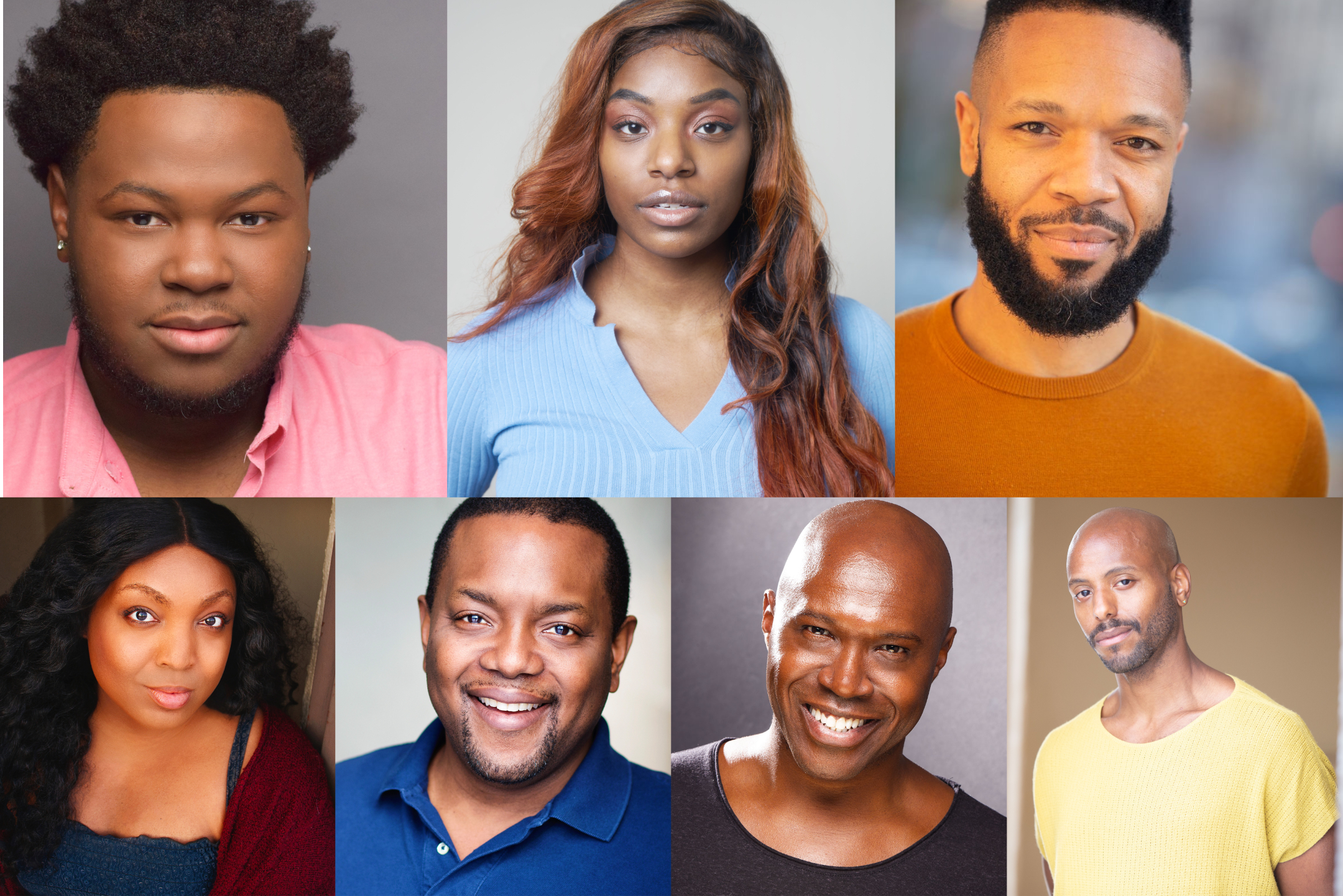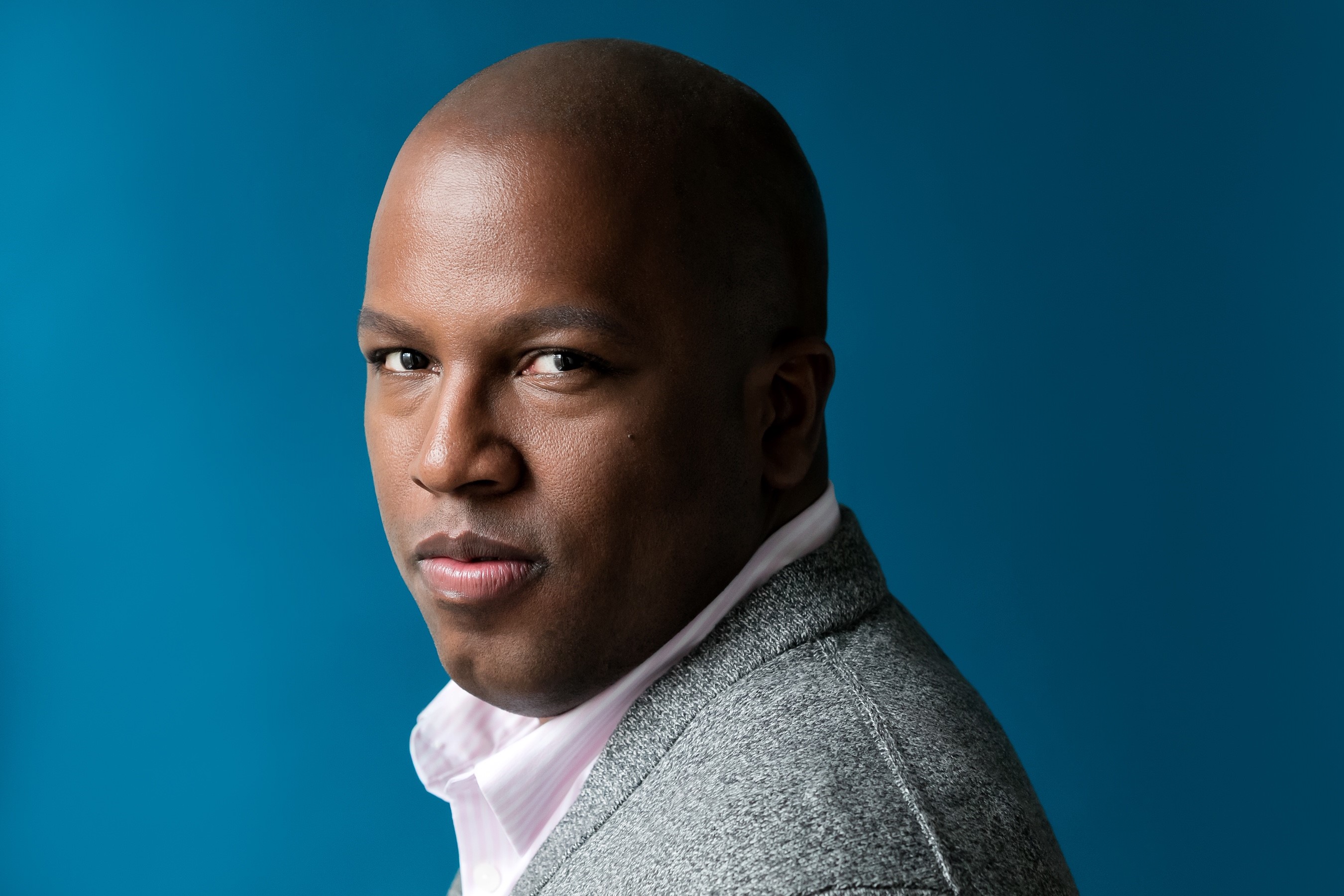
(L to R: Kyle Ramar Freeman, Mars Rucker, Jason Veasey, L Morgan Lee, J.A Morrison, James Jackson Jr., JM Reese) Source: Marc J. Franklin, Blue Photography, L Morgan Lee
A Strange Loop follows Usher, a 25-year-old New York transplant from Detroit that has dreams of having his plays hit Broadway. Usher (Kyle Ramar Freeman), who works as a Broadway usher at the theatre, struggles with his own identity as a Black queer man and can’t hear his own voice over the sounds of his cumbersome thoughts. A Strange Loop, directed by Michael R. Jackson, follows Usher as he tries to pave his own path while everyone around him pulls him in a different direction.
Usher doesn’t know whether to please himself or his God-fearing mother, Sarabi, who thinks a gay spirit infiltrated her son and it can be prayed away. He despises Tyler Perry’s work but is consistently encouraged to follow his lead by his mother. If Sarabi had her way, he would be working on a Tyler Perry-esque gospel play instead of a “radical” musical about a fat Black queer man writing about a fat Black queer man. Usher turned down the chance to ghostwrite a play for Perry and explained why in one of the musical’s numbers, “Tyler Perry Writes Real Life.” He sang, “Nothing that he writes seems real to me” and called his work “just simple-minded hack buffoonery.”
His alcoholic father, Mufasa, won’t embrace him or his work and can’t hide his homophobia, especially when he is drunk. He has a bad habit of poking fun at his insecure son and leaving him appalling voicemails when intoxicated. Like the one where he asked if Usher was attracted to him because he is gay. Sarabi and Mufasa antagonize him for staying in New York after graduating from NYU so he could “play with homosexuals” and catch AIDS, like his late brother Darnell.
You can’t help but root for Usher, who is loosely based on Jackson. He’s bright-eyed and bashful but a bit of a mope on the outside. The insecurities shine through his skin. With no one to believe in his dreams, keeping the faith is like trying not to fall off of a hanging cliff.

Director Michael R. Jackson. Source: Beowulf Sheehan / Beowulf Sheehan
Usher wants to find love but his self-consciousness, anxiety and low self-esteem won’t get out of his way. These feelings are characters in the musical as well. Throughout the production, we get to see his thoughts live and in color. Six actors (L Morgan Lee, James Jackson Jr., John-Michael Lyles, John-Andrew Morrison, Jason Veasey, and Antwayn Hopper) who make up a choir of sorts belt out Usher’s ugliest thoughts through song.
His self-loathing inner dialogue always pops up to remind him that he is worthless as he is trying not to drown in despair. When he looks at his relationship with his family, his non-existent love life and dead-end job and career, he believes his feelings over facts. Usher escaped his depressing reality by dreaming about living life through his “inner white girl.” She symbolized how he wished he could live his life: unapologetic, accepted, privileged and most of all judgment-free.
This Tony and Pulitzer Prize winning musical was more humanizing than ever. Homophobic people see gay men as predators who seek straight men so they can ravish them to appease their sexual appetite. They think they have or will soon have AIDS. Usher’s father taunted him about contracting AIDS while his mother feared the virus would kill him and he would burn in hell. But Usher was facing so much more than being vulnerable to AIDS. He was battling anxiety, depression, fatphobia, and burnout while trying to please everyone but himself.
Since the musical is about a Black queer man writing a musical about a Black queer man, the loop is far from strange. A Strange Loop gives the audience a behind the scenes look into the psyche of the heartbroken artists that write these compelling stories. We often get to see the amazing work they produce, but with A Strange Loop we see the pain, self-doubt and tears that goes into the process. We see how Usher was battling with himself and the world outside that wants nothing to do with them, like many LGBTQIA+ folks do.
I appreciated the unapologetic rawness about Black, gay life from the perspective of a Black man. A Strange Loop took a no holds barred approach. Nothing was sugar-coated, watered down or minimized to make the story more digestible. The scene where Usher has sex with a white man who fetishized him struck me the most. When I thought the scene would end because they were about to engage in intercourse, it actually didn’t.
The lights dimmed and we saw them mimic sex acts. Ass up, face down. As I sat in admiration and amazement at the provocativeness, I was proud that it wasn’t cut. Watching the sex scene gives people a chance to check their implicit bias. Would you be sitting there uncomfortable if this was a heterosexual sex scene? Whether you wanted to see or not, you got a look into what looking for love and lust is like for a desperate self-loather with no boundaries, a genderless experience.
Not all Black, queer men are as confident as we think. We see the Billy Porters and RuPauls (who also produced the musical) of the world and think every gay man exudes confidence, fearlessness, style and grace. Usher showed us the other side, the gay men who are unsure of themselves and don’t know how to use their voice so they do it through art.
RELATED: Jennifer Hudson Achieves EGOT Status After Winning For A Strange Loop At The 2022 Tony Awards


0 Commentaires